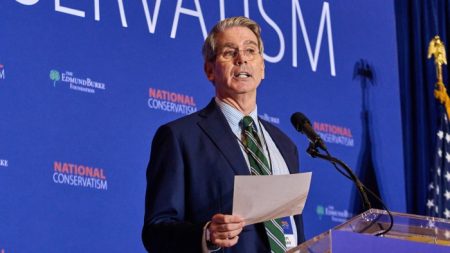The United Kingdom has slipped into recession just months ahead of a general election, official figures showed Thursday, derailing Prime Minister Rishi Sunak’s pledge to generate economic growth.
Gross domestic product fell 0.3% in the final three months of 2023, following a 0.1% contraction in the July-to-September period, the Office for National Statistics said. A recession is commonly defined as two consecutive quarters of contraction.
“All the main sectors fell on the quarter, with manufacturing, construction and wholesale being the biggest drags on growth, partially offset by increases in hotels and rentals of vehicles and machinery,” ONS director of economic statistics Liz McKeown said in a statement.
The ONS estimates that UK GDP increased by 0.1% in 2023. That’s the weakest growth since 2009 when the economy was still reeling from the global financial crisis, if 2020, which was affected by the pandemic, is excluded. Last year’s weak rise in output follows growth of 4.3% in 2022.
Several economists have characterized the economy as “stagnant” over the past year.
“Across 2023 as a whole the economy has been broadly flat,” McKeown said.
The news will come as a disappointment to Sunak, whose ruling Conservative Party is trailing the opposition Labour Party in opinion polls ahead of the election expected this year. While Sunak was able to declare victory three months ago on a separate promise to voters to halve inflation, economic growth has remained elusive.
Combined with high interest rates, the economic contraction could constrain the government’s ability to deliver any meaningful pre-election giveaways, such as tax cuts, in next month’s budget announcement.
“Neither party has fully admitted the fiscal reality,” chief UK economist at Capital Economics Paul Dales wrote in a note last week. “The big question is how will they make the numbers add up when they deal with the implausible cuts in government spending that are currently scheduled?”
Notwithstanding the mild recession, the UK economy has fared much better than many economists feared a year ago, when several were predicting a considerably sharper downturn.
“It’s overly dramatic to label the decline in economic activity in the second half of 2023 a recession, given that employment continued to rise, real wages rebounded and measures of business and consumer confidence returned to levels consistent with rising activity by the end of the year,” Samuel Tombs, chief UK economist at Pantheon Macroeconomics, said in a note Thursday.
Recent economic data has been mixed, but slowing inflation and cuts to interest rates expected later this year could boost activity.
Annual UK inflation was unchanged in January at 4%, undershooting forecasts for a slight rise. That’s still double the Bank of England’s 2% target, but much lower than the record high of 11.1% hit in October 2022.
Food inflation fell to 7% from a recent high of 19.2% in March 2023, the ONS said Wednesday. Compared with the previous month, food prices posted their first decline in more than two years.
Meanwhile, salaries have now grown ahead of prices for seven consecutive months. Average wages excluding bonuses grew at an annual rate of 6.2% in the three months to December, according to the ONS.
“Nominal pay growth is slowing… but inflation is falling faster, causing a welcome, if short-lived, recovery in real wage packets,” said Hannah Slaughter, a senior economist at the Resolution Foundation, a think tank, earlier this week.
Job vacancies have also continued to fall, declining to 932,000 in the three months to January, the lowest since mid-2021.
But ill health continues to be a major driver of worker shortages, with those not in work due to being “long-term sick” now at a record 2.8 million.
“This is holding back the economy, putting pressure on the public finances and the National Health Service, and limiting opportunities for too many people,” said Slaughter.
According to the Resolution Foundation, because of ill health Britain remains the only Group of Seven economy yet to return to pre-pandemic employment levels.
This is a developing story and will be updated.
Read the full article here













